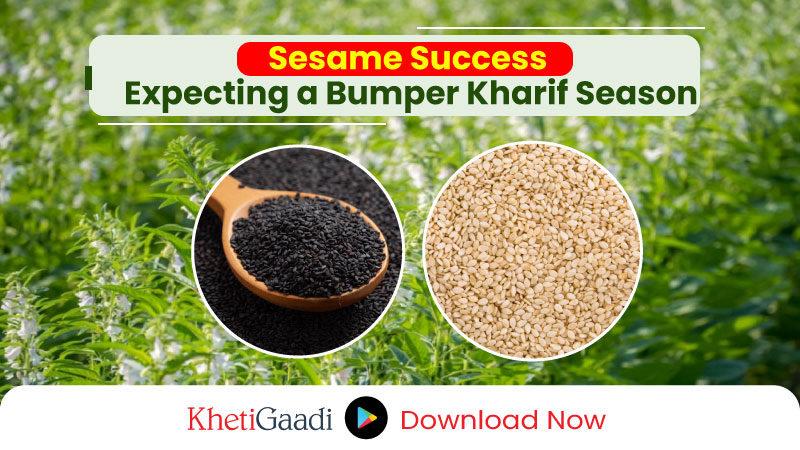Farmers can prosper with sesame cultivation
KhetiGaadi always provides right tractor information
Farmers typically cultivate sesame in February, but it can also be planted in July for a good yield. Sesame is widely used, ensuring a consistent market demand and good prices. The Kharif sowing season has begun, and farmers are preparing their land for crops. By cultivating sesame on their fallow land, farmers can earn significant profits. Sesame is versatile, used for extracting oil and making sweets like laddus. Good production of sesame and its fair prices have been encouraging the farmers to spread its cultivation during the last several years, the sources said.
Dr. R.K. Singh, an agricultural scientist from ICR located in Goria Karma, Hazaribagh, explains that although sesame is usually planted in February, farmers can also plant it in July. Sesame’s extensive uses keep its market price favourable.
Optimal Conditions for Sesame Cultivation
Dr. Singh mentions that sesame requires a temperature range of 25 to 35 degrees Celsius. Temperatures above 40 degrees Celsius can halt oil extraction from seeds. Farmers should choose fields with a pH level between 5.5 and 7.5, and soil that is loamy or sandy. Farmers can plant varieties like Ekta and Western 404. They should use 7 to 8 kg of seeds per acre, yielding 3 to 4 quintals per acre. The crop takes 90 to 100 days to mature.
If you wish to know organic methods to increase your overall cultivation yield, please call KhetiGaadi counsellor on 07875114466 or write an email to connect@khetigaadi.com
Essential Tips for Successful Harvest
To ensure a good harvest, Dr. Singh advises regular weeding and hoeing after sowing. Farmers should avoid waterlogging, as standing water can destroy crops. Regular spraying of pesticides based on prevalent diseases is also crucial.
Why is sesame gaining fame?
Nutritional Value: Sesame seeds are rich in essential nutrients, including protein, fibre, and healthy fats. They are a great source of vitamins and minerals such as calcium, iron, and magnesium, which contribute to various health benefits.
- Market Demand: The demand for sesame is not limited to local markets. Sesame seeds and oil are exported to various countries, creating an international market. This global demand helps stabilize prices and provides farmers with a steady income.
- Uses in Cuisine: Sesame seeds are used in a variety of culinary applications, from sprinkling on bread and pastries to making tahini, a key ingredient in Middle Eastern cuisine. The oil is valued for its nutty flavour and high smoke point, making it ideal for cooking and salad dressings.
- Health Benefits: Sesame oil is known for its potential health benefits, including anti-inflammatory properties and heart health support. It is also used in traditional medicine for its therapeutic properties.
By understanding the optimal conditions and best practices for sesame cultivation, farmers can maximize their yield and profit, contributing to a more prosperous agricultural sector.
Stay tuned with us on our whatsapp channel for more real time updates on various agriculture related schemes and innovative cultivation methods aimed at supporting our hardworking farmers. For more detailed information, visit https://khetigaadi.com/ regularly!
To know more about tractor price contact to our executive






